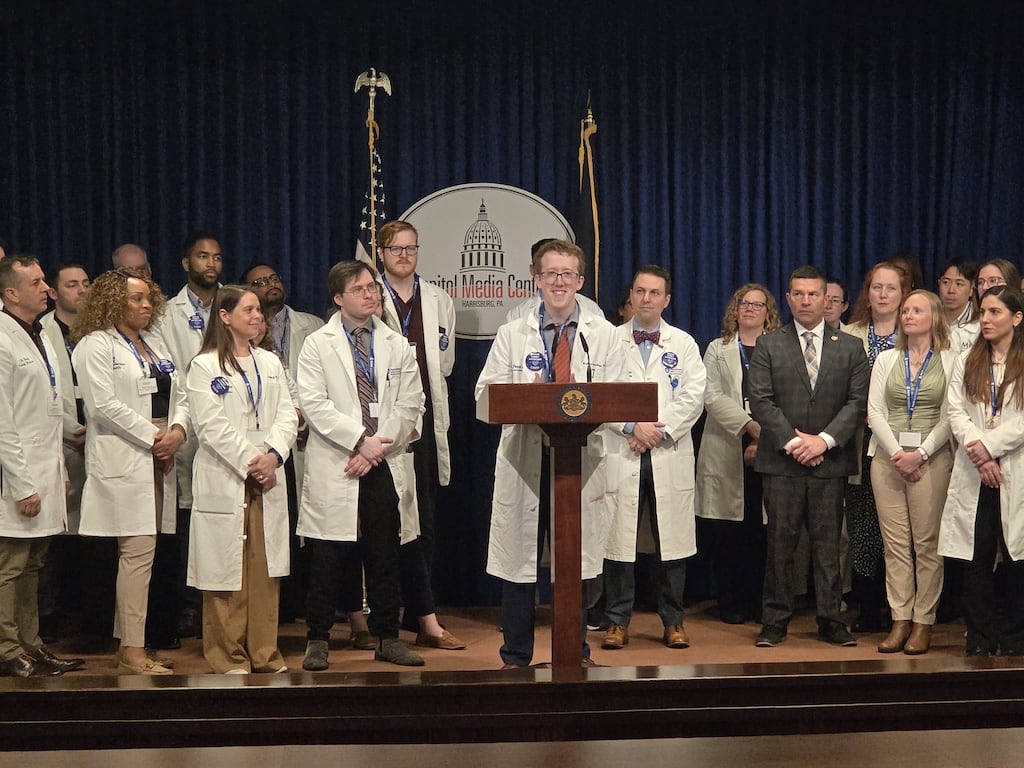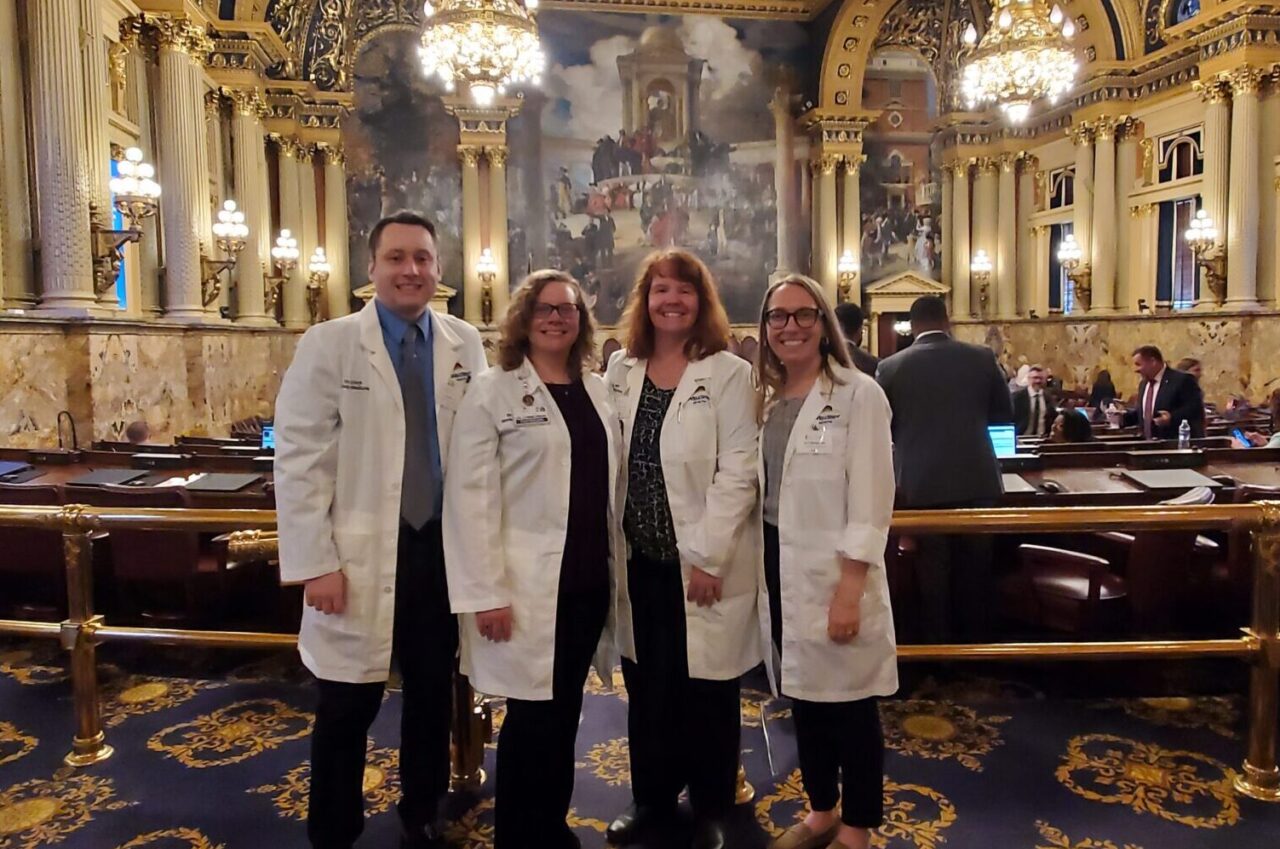
Advocacy
Fighting for family medicine in Harrisburg and beyond.
Find out what the PAFP is doing to protect and promote the specialty of family medicine in Pennsylvania.
Are you interested in advocacy?
PA Legislative Agenda
The PAFP’s 2025-26 legislative priorities are based on feedback from our annual member survey. These are the issues that Pennsylvania’s family physician community has identified as being critical to patient care, the practice of primary care, and the advancement of family medicine.
Act 146 of 2022, supported by the PAFP, represents the Commonwealth’s most meaningful health insurance reform measure in more than two decades. While this was a crucial step toward bringing transparency and consistency to the prior authorization process, there is still work to be done to ensure timely patient care and continuity of care. Other administrative hurdles, such as credentialing processes imposed on physicians by health insurance providers, take physician time away from patients, delaying access to quality health care. Additionally, when insurers make changes to their drug formularies, it disrupts patient care by requiring the treating physician to resubmit a prior authorization or switch the patient to a different medication. The PAFP supports legislation that would streamline health insurer credentialing processes and address other administrative hurdles to ensure timelier patient care and continuity of care.
Delivery of quality primary care is critical to ensuring better health outcomes and lower health care costs and patients are best served when a physician-led, highly coordinated team provides care. While health care providers, such as Certified Registered Nurse Practitioners (CRNPs), Physician Assistants (PAs), and psychologists are integral, valuable members of the health care team, held in the highest regard by family physicians, patient safety must be the top priority. Collaborative agreements with, and physician oversight of non-physician health care providers help ensure patient safety while still allowing non-physician providers to practice to the full scope of their education and training. The PAFP opposes legislation that would expand non-physician providers’ scope of practice beyond their education and training and eliminate formal collaborative agreements with physicians.
“Venue shopping” refers to the practice of funneling civil liability cases to geographic areas with traditionally high-verdict court systems. The practice resulted in a medical liability crisis in the early 2000’s but was halted by a 2003 court decision that required cases to be filed where the cause of action or injury occurred. Since the Pennsylvania Supreme Court’s decision to reverse the long-standing prohibition on venue shopping beginning in January of 2023, there has been serious concern within the physician community about the potential for increased premiums, increased health care costs, and a reduction in patient access to health care. The PAFP supports legislative initiatives aimed at curbing the expected negative impact on the Commonwealth’s health care climate and access to care. Such actions include reforming Pennsylvania’s Certificate of Merit practice to reduce delays in litigation, decrease potential litigation costs, and facilitate early resolution of claims without unnecessary litigation, and creating an Interbranch Commission to study the impact of venue shopping.
The PAFP, through a grant from the Pennsylvania Department of Health, administers the Family Medicine Residency Expansion program, which seeks to generate family physician residency graduates for the state’s primary care workforce. As part of the 2022-23 and 2023-24 fiscal year budgets, the program received an increase to further expand its impact on communities across the Commonwealth. A PAFP-supported study in 2021 by the Joint State Government Committee on the efforts of Pennsylvania’s medical schools to promote family medicine called for greater investment in and expansion of the state’s existing primary care pipeline programs, which aligns with the PAFP’s work to advance the specialty of family medicine within the Commonwealth. The PAFP further supports policies, such as eliminating non-compete clauses in physician employment contracts, that would help expand the Commonwealth’s primary care physician workforce and increase access to family physicians for all Pennsylvanians.
The PAFP recognizes the varying personal, religious, and moral beliefs of our members and the scope of health care services they choose to provide. The PAFP supports the evidence-based practice of medicine and access to safe, medically sound health care services, including reproductive and maternity health services, for all Pennsylvanians. Additionally, the PAFP opposes the criminalization of evidence-based medicine; government infringement on the confidential relationship between physicians and their patients; legislation that regulates the content or scope of information exchanged between a patient and physician; and legislative limitations on patient autonomy in making decisions about their health care.
Evidence shows that high quality, accessible primary care helps keep populations healthier longer and lowers the overall costs of health care. Yet, Pennsylvania lags behind other states in investing in primary care services. The PAFP supports measures that prioritize shifting more health care dollars to primary care, strengthening the Commonwealth’s health care infrastructure. Additionally, the PAFP supports alternative health care practice and payment models, such as Direct Primary Care (DPC) and value-based payment, to increase access to quality, affordable primary health care and improve population health.
HiAP is a collaborative approach that integrates health considerations into policymaking across state government to improve the health of all communities and people. The PAFP supports the adoption of a HiAP strategy to help address social determinants of health and health disparities and assist the Commonwealth in developing the most effective and achievable means for improving the health and well-being of all Pennsylvanians.
Telemedicine has become an increasingly common form of health care, especially given the recent COVID-19 pandemic; however, reimbursement rates for telemedicine services continue to fall short of those for in-person health care visits. While the PAFP supported Act 42 of 2024, more needs to be done to bring the service of and payment for telehealth care in line with in-person visits. Specifically, the PAFP encourages the inclusion of the following provisions in any telemedicine policy: requires scope of practice and payment parity for all telehealth services on par with in-person office visits; requires reimbursement for telehealth audio-only visits at parity with in-person office visits; ensures that primary care telehealth services be conducted within the context of an existing, comprehensive primary care relationship; does not contain carve outs for the prescription of certain medications or treatment, including buprenorphine and opioids; permits interstate licensing for the practice of telemedicine; and standardizes home and work settings as eligible sites of service across all insurance providers to decrease regulatory burden of all telehealth services and provide high quality, safe and timely patient care.
Given the ongoing opioid crisis in Pennsylvania, access to care for patients suffering from substance use disorder is more critical than ever. State regulations that would place additional barriers on providers already federally approved to prescribe medication for opioid use disorder could jeopardize patient access to office-based opioid treatment. The PAFP opposes legislation that would create additional hurdles at the state level for prescribers of buprenorphine and other medications for opioid use disorder who have already been approved to prescribe such medications by the federal Drug Enforcement Agency.
The PAFP supports legislation that would ensure the availability of effective, safe, and affordable medications through governmental authority to promote competition and availability, transparency, patient-centric pricing, drug price negotiation and review.
The PAFP supports legislation and policies that would help ensure the increased health, safety, and quality of life of all Pennsylvanians through collaboration with state agencies, the Pennsylvania General Assembly, and the Administration.
Gun violence is an ever-increasing problem in communities across Pennsylvania and the United States. Every year, too many Pennsylvanian lives are taken by gun violence and firearm injuries. While the PAFP recognizes the diverse views of our members, it is important to acknowledge the risks associated with firearm ownership and the reality of the prevalence of illegal weapons within our communities. The PAFP views gun violence as a public health crisis and encourages increased education about safe gun ownership practices and awareness of community resources that promote gun safety. Furthermore, the PAFP supports legislation that encourages the safe storage and handling of firearms; implements the use of Extreme Risk Protection Orders (ERPOs) with limited liability for good faith reporting; requires universal background checks for all firearm purchases; and mandates reporting of stolen firearms. The PAFP also supports research on the effectiveness of gun safety laws and gun violence statistics.
PAFP’s State Legislative Agenda is crafted through the Government and Practice Advocacy Committee with position decisions made by the Board of Directors.
Questions/Comments? Please contact Jennifer Reis, Chief Government Affairs Officer at jreis@pafp.com.
Advocacy
Amplify your voice and address the issues most important to you as a family physician.
Use the AAFP Speak Out tool to take action on specific federal or state legislation that may impact family medicine.

Watch for details about our 3rd Annual Family Medicine Advocacy Day – Coming Spring 2026!
All PAFP members are invited to don their white coats and join us at the Pennsylvania State Capitol Building next spring to speak with legislators and advocate for family medicine.

Grassroots Advocacy: Tips & Guidelines
One of the ways primary care professionals can effect change is to personally engage those individuals who write and pass legislation on the state level. Physicians and medical students are well-respected members of the community and having their voices heard makes a difference. The PAFP has put together some Grassroots Advocacy Tips to help you get involved.
Advocacy Resources
Physicians, residents, and medical students are well-respected members of the community and having their voices heard makes a difference. These tools can help you get started.
AAFP Advocacy Efforts
Protect family medicine at the national level
Download Grassroots Advocacy PDF
Learn how to make a difference in your community
How to Read a Bill
Identify components that affect family physicians
Download PAFP Legislative Agenda PDF
Read more details about PAFP priorities
Government & Practice Advocacy Committee
This committee guides our policy positions on health care legislation and regulations. PAFP members interested in joining, please visit our Members Only page to view committee descriptions or email Jennifer Reis, Chief Government Affairs Officer.